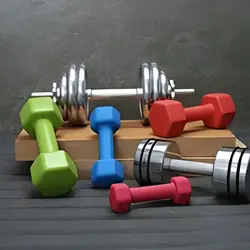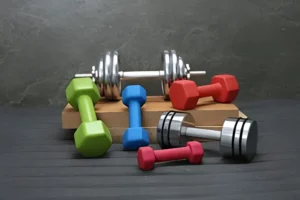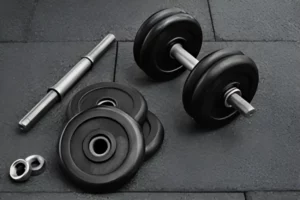As an Amazon Associate, I earn from qualifying purchases.
This article from the teamkathycarter website discusses “which dumbbells are best rubber or steel” and compares these two kinds of dumbbells in detail. Dumbbells are a piece of adaptable and essential gear for any home gym or fitness lover. They come in different materials, Like rubber, steel, and cast iron. Each material has its own unique advantages and disadvantages, so it’s crucial to pick the right ones for your needs.
Steel Dumbbells- Which Dumbbells are Best Rubber or Steel?
Steel dumbbells are assembled from a mixture of diverse grades of steel. The most standard quality of steel utilized for dumbbells is A36 steel. A36 steel is a strong and long-lasting material that is also relatively affordable. It is also readily welded, which is essential for assembling dumbbells.
Manufacturing Steel Dumbbells- Which Dumbbells are Best Rubber or Steel?
Dumbbells are a nail in any home gym or fitness lover’s arsenal, presenting versatility and significance for muscle training. Among the different kinds of dumbbells available, steel dumbbells stand out as a famous option due to their durability, affordability, and expansive range of weight options. However, like any training kit, steel dumbbells have notable advantages and disadvantages to consider before purchasing.
Advantages and Disadvantages of Steel Dumbbells
Dumbbells are a staple in any home gym or fitness enthusiast’s arsenal, offering versatility and effectiveness for strength training. Among the various types of dumbbells available, steel dumbbells stand out as a popular choice due to their durability, affordability, and wide range of weight options. However, like any exercise tool, steel dumbbells have their own unique set of advantages and disadvantages to consider before making a purchase.
Advantages of Steel Dumbbells:
- Durability and Longevity: Steel dumbbells are famous for their stability. They are qualified to withstand heavy use and resist damage over time. Their solid steel structure ensures they can withstand regular repetitions and drops without compromising their integrity.
- Affordability: Compared to other materials like rubber or cast iron, steel dumbbells typically fall into a more budget-friendly category. This makes them an adorable alternative for those starting or looking for a cost-effective way to extend their home gym collection.
- Variety of Weight Options: Steel dumbbells are available in a wide range of weights, catering to all fitness levels and workout goals. Whether a beginner desires lighter weights to build momentum or a professional lifter aiming for heavier challenges, steel dumbbells present the flexibility to advance effectively.
- Resistance to Rust and Corrosion: Steel dumbbells are typically resistant to rust and corrosion when covered with a protective layer. This assures that they can maintain their formation and functionality even in humid circumstances or with rare exposure to moisture.
Disadvantages of Steel Dumbbells:
- Noisy When Dropped: Although steel dumbbells are generally resistant to rust, they can still develop rust if not correctly maintained. Regular wiping down and storing them dry can help prevent rust formation.
- Potential for Rust if Not Properly Care For: While generally rust-resistant, steel dumbbells can develop rust if not correctly cared for. Regular wiping down and storing them in a dry environment can help prevent rust formation.
- Less Comfortable Than Rubber Dumbbells: Steel dumbbells’ solid steel structure may be less comfortable than rubber dumbbells, particularly for exercises demanding protracted hand contact.
- Weight Plates May Shift or Loosen: Steel dumbbells are a popular choice for strength training, but the weight plates may shift or loosen over time. This can lead to an imbalanced weight distribution, which can be dangerous during exercise. To maintain balance and safety, it is essential to periodically check and tighten the weight plates on your steel dumbbells. This can be done by simply using a wrench or pliers to tighten the bolts or screws that hold the leaves in place. By taking this simple step, you can ensure that your steel dumbbells remain safe and effective for your workouts.
Rubber Dumbbells- Which Dumbbells are Best Rubber or Steel?
Rubber dumbbells are softer than steel dumbbells and less likely to damage floors. They are also a good option for people who are concerned about allergies, as they do not contain latex. However, rubber dumbbells are less durable than steel dumbbells and may withstand less weight.
Manufacturing Rubber Dumbbells- Which Dumbbells are Best Rubber or Steel?
Rubber dumbbells are made from a combination of various kinds of rubber. The most standard type of rubber used for dumbbells is synthetic rubber. Synthetic rubber is a strong and long-lasting material that is also relatively affordable. It is also quickly developed into various shapes, which is crucial for making dumbbells.
Advantages and Disadvantages of Rubber Dumbbells
Advantages of Rubber Dumbbells:
- Quieter: Rubber dumbbells are much softer than steel dumbbells when dropped, making them a famous choice for home gyms or apartments where noise is trouble. The rubber coating minimizes the clanging sound usually associated with metal weights.
- Comfortable Grip: Rubber dumbbells deliver a comfortable grip due to the soft, textured cover. The rubber coating provides a protected hold, preventing slippage and relieving hand tiredness during workouts. This comfortable grip can particularly benefit individuals with sensitive hands or grip problems.
- Floor Protection: Rubber dumbbells are a better choice for gym flooring as they are less likely to cause damage than steel dumbbells. The rubber coating prevents scratches and marks on hardwood floors, tiles, or gym mats. This protective feature is crucial for home users who want to preserve their flooring.
- Reduced Bounce: Rubber dumbbells bounce less than steel dumbbells when dropped. The rubber layer absorbs some of the effects, minimizing the rebound height and lowering the risk of unexpected damage to surrounding equipment or property.
- Durability: Rubber dumbbells are generally durable and can withstand regular gym or home workouts. The rubber coating protects the core weight from rust and corrosion, extending the lifespan of the dumbbells.
Disadvantages of Rubber Dumbbells:
- Higher Cost: Rubber dumbbells are generally more costly than steel dumbbells due to the added cost of the rubber coating material and manufacturing method. The durability and noise-reducing effects of rubber contribute to the higher price point.
- Prone to Damage: Rubber dumbbells can be damaged by sharp objects or extreme force, so avoid dropping them on sharp edges or surfaces to stop tears or cuts in the rubber coating
- Weight Limitations: Rubber dumbbells may have weight restrictions compared to steel dumbbells. The rubber coating adds bulk to the weight, so heavier sets may not be available or as compact as their steel counterparts.
- Odour: New rubber dumbbells may emit an odour when first used, which typically dissipates over time. However, individuals sensitive to rubber smells may find it unpleasant.
- Grip Wear: The rubber coating may wear down over time, particularly with regular use. This wear to can affect the grip and aesthetics of the dumbbells.
Ultimately, the best type of dumbbell will depend on your necessities and preferences. A steel dumbbell is a good choice if you are looking for the most long-lasting dumbbell that can resist the most weight. However, a rubber dumbbell is a better option if you are concerned about noise or floor damage.
Here are some additional factors to consider when choosing between steel and rubber dumbbells:
- Your workout space: If you have limited space, a set of adjustable dumbbells may be a good option. Adjustable dumbbells can be fast and quickly changed to different weights, saving you space and money.
- Your experience level: Start with a lighter-weight dumbbell if you are a beginner. As you get more muscular, you can slowly increase the weight of the dumbbell.
- Your budget: Steel dumbbells are generally more costly than rubber dumbbells. However, they are also more durable and can resist more weight.
Use it safely and effectively regardless of which kind of dumbbell you prefer. Always warm up before using dumbbells and cool down afterward. Use valid forms to avoid injury. And if you need help using a dumbbell, ask a trainer for help.
Which Type of Dumbbell is Right for You?
The best type of dumbbell for you will depend on your individual necessities and preferences. Steel dumbbells are a good choice if you are on a budget. Rubber dumbbells are a good option if you are looking for a soft and comfortable dumbbell. And if you need the heaviest and longest-lasting dumbbell, cast iron dumbbells are a good option.
Here is a table summarizing the advantages and disadvantages of each type of dumbbell:
| Type of Dumbbell | Advantages | Disadvantages |
| Steel | Durable, long-lasting, affordable | They can be noisy when dropped, can rust if not correctly cared for, and are less comfortable to use than rubber dumbbells. |
| Rubber | Quieter, more comfortable to use, less likely to rust or damage your flooring | They are more expensive and less durable than steel dumbbells and can be damaged by sharp objects. |
As an Amazon Associate, I earn from qualifying purchases.






